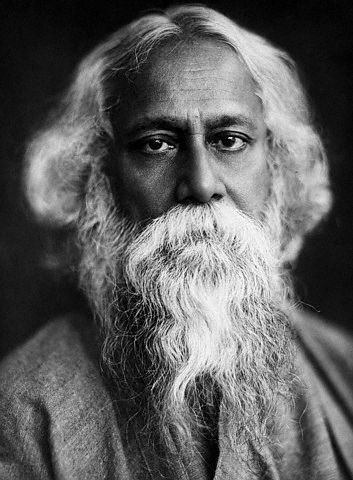Rabindranath Tagore (May 7, 1861, Calcutta [now Kolkata], India—August 7, 1941, Calcutta), Bengali poet, short-story writer, song composer, playwright, essayist, and painter who liberated Bengali literature from traditional models based on classical Sanskrit by introducing new prose and verse forms and the use of colloquial language. He was awarded the Noble Prize for his poetry collection "Gitanjali" in 1913.
Rabindranath Tagore (1861-1941) was the son of Debendranath Tagore, a leader of the Brahmo Samaj and also a religious reformer. He was born in Calcutta. Tagore began writing poetry at a young age. After finishing his studies in England in the late 1870s, he returned to India and began publishing poetry volumes in the 1880s. Tagore established an experimental school in Shantiniketan in 1901, with the goal of combining the best of Indian and Western traditions. Tagore traveled widely throughout Europe, the Americas, and East Asia, lecturing and reading his poems, and becoming a champion for Indian independence from British colonial control.
Life & Works
Both Indian and Western learning traditions are strongly embedded in Rabindranath Tagore's writing. It comprises descriptions of ordinary people's lives, literary criticism, philosophy, and social issues, in addition to fiction in the form of poetry, songs, stories, and tragedies. Rabindranath Tagore wrote in Bengali at first, but after recasting his poetry in English, he was able to reach a wider audience in the West. His poetry was thought to depict the tranquility of the soul in connection with nature, in contrast to the frantic existence in the West.
In the 1880s, he wrote several collections of poetry and completed Manasi (1890), a collection that marked the maturation of his creativity. It includes some of his most well-known poems, many of which are in new verse forms for Bengali, as well as social and political satire directed at his fellow Bengalis.
Tagore moved to East Bengal (now Bangladesh) in 1891 for ten years to maintain his family's lands at Shilaidah and Shazadpur. He frequently resided in a houseboat on the Padma River (the Ganges River's main channel), where he came into close touch with local people, and his sympathy for them became the central theme of much of his later writing. Most of his best short stories, which focus on "humble lives and their tiny tragedies," were written in the 1890s and have a sense of sadness and mild sarcasm that is unique to him (though admirably captured by the director Satyajit Ray in later film adaptations).
Tagore grew to like the Bengali countryside, particularly the Padma River, which appears in many of his poems. During this time, he released several poetry collections and plays, including Sonar Tari (1894; The Golden Boat) and Chitrangada (1892; Chitra). Tagore's poems are nearly impossible to translate, as are his over 2,000 songs, which have a wide appeal among Bengalis of all social groups.
Years of grief following the loss of his wife and two children between 1902 and 1907 are mirrored in his later poetry, which was first published in Gitanjali (Song Offerings) (1912). W.B. Yeats and André Gide praised this work, which contained Tagore's English prose translations of religious poems from several of his Bengali lyric collections, notably Gitanjali (1910), He was a key figure in conveying Indian culture to the West and vice versa, and he is widely recognized as India's most creative artist of the early twentieth century. He was the first non-European to win the Nobel Prize for Literature in 1913. In 1915, Tagore was knighted, but he renounced it in 1919 in protest of the Amritsar (Jallianwalla Bagh) Massacre.
Tagore spent significant amounts of time outside of India beginning in 1912, speaking and reading from his work in Europe, the Americas, and East Asia, and becoming an impassioned advocate for Indian freedom. Tagore's Bengali novels, Gora (1910) and Ghare-Baire (1916), are less well-known than his poems and short tales; they are translated into English as Gora and The Home and the World, respectively. Tagore began painting in his 60s, when he was in his late twenties, and produced works that earned him a place among India's best contemporary artists.
Here are some motivational quotes from Rabindranath Tagore.
"You can't cross the sea merely by standing and staring at the water."
"The
butterfly counts not months but moments, and has time enough."
"If you
shut the door to all errors, the truth will be shut out."
"Let me
not pray to be sheltered from dangers, but to be fearless in facing them."
"If you
cry because the sun has gone out of your life, your tears will prevent you from
seeing the stars."

Post a Comment